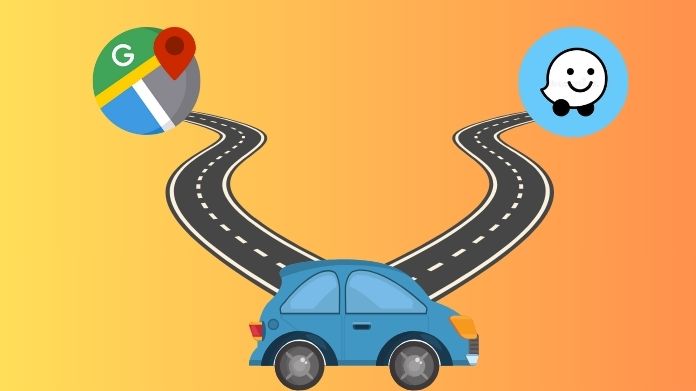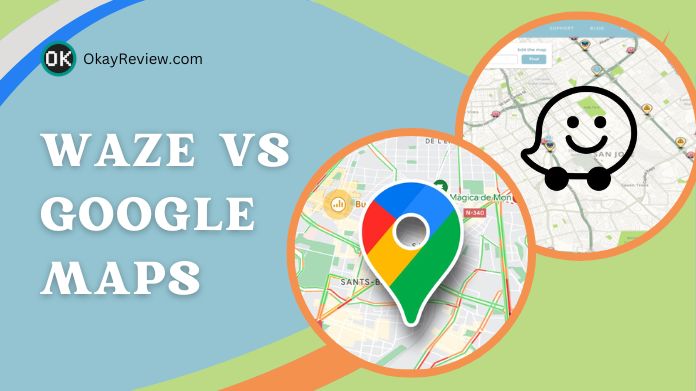Just imagine you’re racing against time to get to a meeting and find yourself at an actual crossroads. The choice you make now can either get you there on time or leave you crafting a rather embarrassing late apology.
This is a common predicament for today’s drivers, easily navigated with the help of two titans in the navigation world: Waze vs Google Maps.
Both apps guide millions of drivers every day. The question is, which one deserves the prime spot on your car’s dashboard with CarPlay or Android Auto?
Let’s dive deep and explore which app truly takes the lead.
Table of Contents
Brief Overview of Google Maps and Waze
Since its launch in 2005, Google Maps has journeyed from a basic mapping service to an all-encompassing navigator, decking out trips with satellite views and street-level insights for smooth travels.
Meanwhile, Waze, stepping onto the scene in 2006, has transformed driving by blending traditional routes with the power of the people, alerting drivers to the likes of traffic snarls and sneaky speed traps with the immediacy only real-time can offer.
Waze vs Google Maps – Choose Your Champion
Finding the optimal route is no longer just a convenience in the digital era; it’s a daily need. Whether you’re a commuter navigating rush-hour traffic or an adventurous exploring unfamiliar territory, the decision between Waze vs Google Maps might influence your experience.
 Let’s delve into the complexities of these navigation giants to help you select your champion.
Let’s delve into the complexities of these navigation giants to help you select your champion.
1. Waze vs Google Maps – User Interface and Design
Consider your navigation app to be equivalent to your car’s dashboard. You want something informative but not overpowering.
Google Maps has a slick, user-friendly interface. It’s like a well-organized buddy who always has their life in order. It’s easy for both first-timers and seasoned tourists to navigate, thanks to clear maps and plain directions.
Waze, on the opposite side of the road, has a colourful and engaging interface. The outgoing cousin always knows the newest gossip.
Its bright notifications and real-time traffic symbols may appear cluttered at first, but they’re a lifesaver for avoiding traffic jams.
Personal anecdote: Waze once transformed my regular dismal commute into a real-time strategic game, allowing me to dodge traffic with ease!
2. Waze vs Google Maps – Navigation and Routing Accuracy
When it comes to getting from point A to B, Google Maps is like a wise old owl, using years of data to recommend the fastest or most scenic routes.
It’s saved me more than once on long road trips by suggesting picturesque detours away from dreaded highway jams.
Waze, on the other hand, thrives on the here and now. Powered by community updates, it’s uncannily adept at rerouting around a four-car pile-up that happened just minutes ago. It’s like having a local guide in your car, whispering shortcuts only the residents know.
3. Waze vs Google Maps – Traffic Data and Real-Time Updates
Here’s where Waze excels. Its real-time user updates may be like having a sixth sense, alerting you to potential risks or police presence.
Remember when you dodged a speed trap owing to an anonymous Good Samaritan on Waze? That is the communal spirit in action.
Google Maps, while more reserved, still keeps a steady finger on the pulse of traffic. Its alerts might not be as immediate, but they’re backed by a wealth of historical data, ensuring reliability even on less-travelled roads.
4. Waze vs Google Maps – Offline Functionality
Have you ever found yourself in a signal dead zone, with your GPS app as lost as a kitten? Google Maps provides downloaded maps, which are very useful in isolated places.
I recall hiking across remote Scotland with only my downloaded Google Maps to guide me—truly a digital compass.
Waze is more of a social creature, preferring constant connection to deliver its best. While it offers limited offline routes, it’s at its heart a creature of the connected world.
5. Waze vs Google Maps – Additional Features and Integrations
Google Maps is a multipurpose tool that provides views ranging from satellite to street level, as well as interior maps for navigating enormous structures.
The abundance of location evaluations also makes it a mini-travel guide. Waze focuses on the driving experience, including unique features such as gas pricing and police notifications to keep you as informed as possible on the road.
6. Waze vs Google Maps – Voice Navigation and Commands
Google Maps’ voice instructions are refined, leading you like a seasoned navigator. It’s like having a composed co-driver who never panics, even if you’ve missed the same exit twice.
Waze provides a more personalized experience, allowing you to select from a number of voices, including celebrities and your own recordings.
It’s like turning your travel into a road trip with a friend who never gets tired of telling you where to go.
7. Waze vs Google Maps – Data Usage and Battery Consumption
On lengthy travels, having your phone charged becomes just as important as fuelling your automobile. Google Maps, with its realistic visuals, may be data and power intensive.
In comparison, despite its active social updates, Waze is lower on data but still requires a considerable amount of battery life to keep you in the loop.
8. Waze vs Google Maps – Community and Social Features
Waze survives in its community a vibrant network of drivers that exchange real-time road information. It’s like being a member of an elite club where everyone watches out for one another.
Google Maps, while more lonely, has begun to embrace social elements, including user-reported occurrences. Despite this, it seems like going through a calm neighborhood as opposed to Waze’s busy metropolis.
Wrapping Up!
Choosing between Waze vs Google Maps comes down to your needs. If you value real-time updates and community-generated insights, Waze is your copilot. Google Maps, on the other hand, is a complete navigation tool that includes many forms of transportation as well as precise maps.
Remember that in the realm of navigation, the best road is the one that fits your needs. So, examine your individual requirements and allow them to influence your decision.
After all, in life, we are all striving for the greatest way forward.


Excellent comparison! Your breakdown of Waze vs. Google Maps is insightful and highlights the strengths of both platforms. I love how you’ve detailed their features, user experiences, and scenarios where each app shines. This is super helpful for anyone deciding which navigation tool to use.